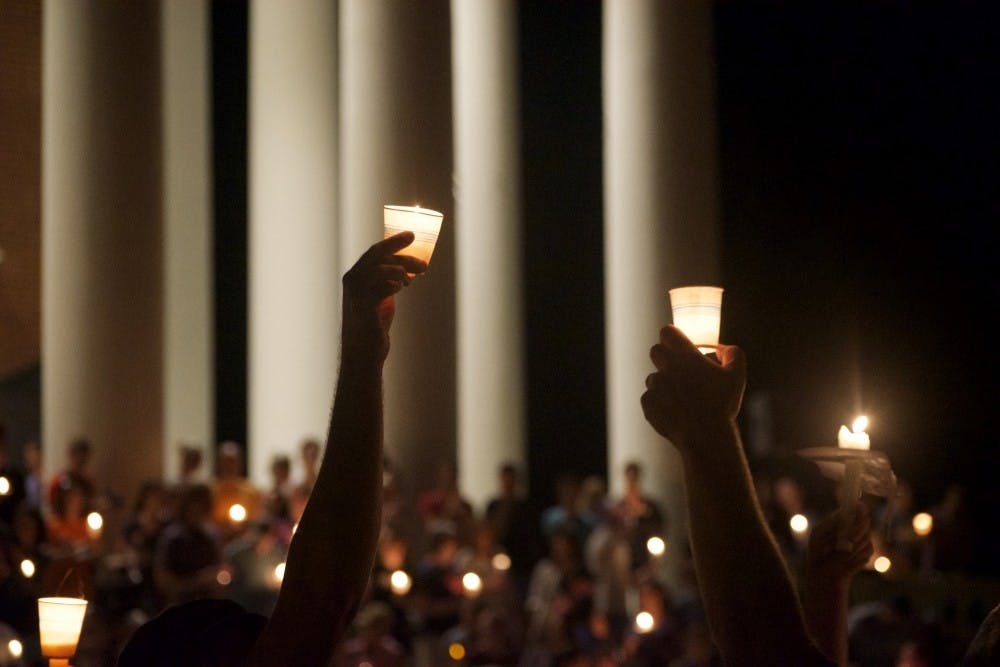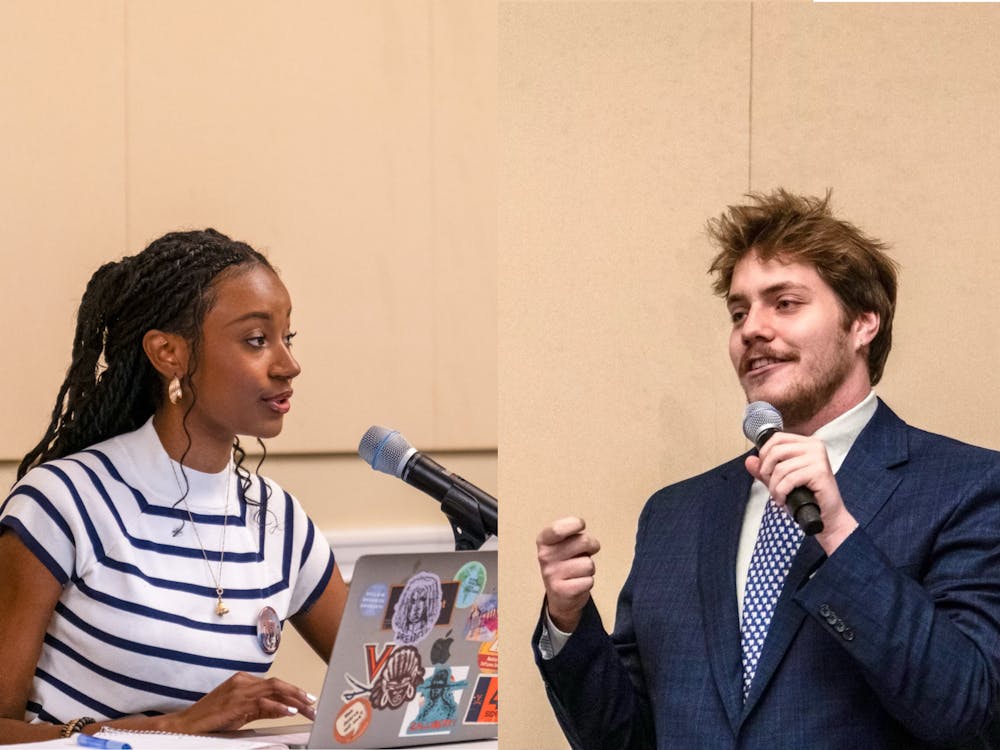Just over a month has passed since the events of Aug. 11 and 12, when white nationalist groups descended on Charlottesville.
On the evening of Aug. 11, they marched through Grounds carrying tiki torches and yelling anti-Semitic slogans. Their march came to an end at the statue of Thomas Jefferson north of the Rotunda, where clashes between white nationalists and counter-protesters resulted in numerous injuries.
The events of Aug. 12 saw white nationalists come to downtown Charlottesville for the “Unite the Right” rally, where they were met with various counter-protests. The events turned deadly when a car plowed into a crowd of people near the pedestrian Downtown Mall, injuring at least 35 people and killing 32-year-old Charlottesville resident Heather Heyer.
James Alex Fields Jr., a 20-year-old man from Ohio, has been arrested in connection with the car attack and he faces multiple felony charges, including second-degree murder.
The following is a collection of quotes from students, faculty and Charlottesville community members regarding their experiences during those days, their reflections after the events were over and their memories of the candlelight vigil held on the Lawn on Aug. 16.
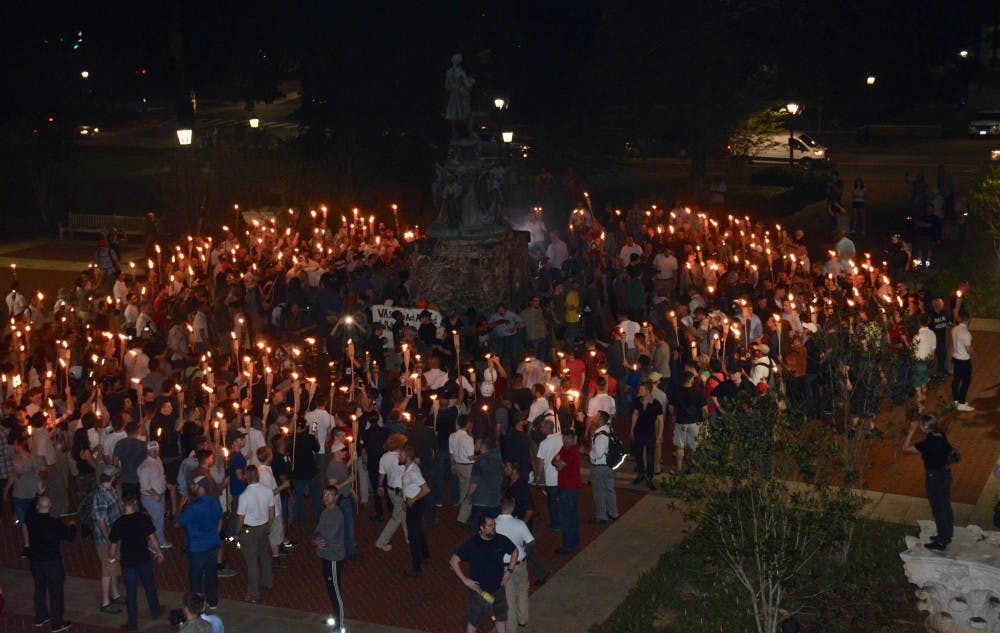
Thoughts from Aug. 11, the day when several hundred white nationalists marched through Grounds wielding tiki torches, shouting, “White Lives Matter” and “You will not replace us!”
“It was still kind of calm, and then out of nowhere, we started to see some light come around the east and west sides of the Rotunda up on that upper level porch. From there it was just a flood of tiki torches and screaming coming over the Rotunda and down the north side of the stairs. It honestly felt like an eternity that they kept coming over. We didn’t know exactly how many there were because we had only seen a few of them when we were driving through Grounds, but they just kept coming and coming to the point where we were standing probably a hundred yards back from the bushes that surround that side by the chapel and that level was full, and they were still coming over the side of the Rotunda.” — Third-year College student Lukas Pietrzak
“My wife started going on Twitter and hearing about the rally — the thing that was happening on campus. The first reaction I think was one of dissonance — the kind of weirdness of having been right there but in a different place. The shock of it having been right on campus. It shouldn’t have been so shocking in many ways, I mean we knew the people were here and I was certainly gearing up for something like what happened on Saturday, but somehow, mentally I disassociated the campus from the town.” — History Prof. Kyrill Kunakhovich
"As planned beforehand, I opened Pavilion IV and sent all the students we could find — whether Lawn residents or not — down to the basement so they could escape out the back door into the Garden if necessary. Malcolm [Stewart] and I then returned to the Lawn, and I decided to take as many photos as possible on my iPhone. We followed the neo-Nazis to the Rotunda plaza, and saw the fistfights and altercations … To watch hundreds of torch-wielding neo-Nazis march up the Lawn in a long, awful procession, chanting their nauseating racist and anti-Semitic slogans — some taken directly from the Third Reich — was otherworldly. I was struck by how young many of them were, how regimented they were — suggesting lots of preparation." — Politics Prof. Larry Sabato
“I spent my summer taking 45 teenagers to Poland to visit seven concentration camps, and I got home Aug. 8. So the idea that I spent my summer learning about this history and how tough it is and how anti-Semitism exists in America but how much we’ve moved forward — then coming home to America and this happening, it really, really hit a nerve very deep.” — Fourth-year Nursing student Talia Sion
“For the evening of Aug. 11, they certainly did have advance knowledge of the likelihood of a white nationalist rally on the Lawn. They could have let students know about the danger, and they could have also had police there.” — Third-year College student Reese Fulgenzi
“I did not know at the time about the Aug. 11 torchlit rally and only found out about it when I woke up on Aug. 12. I had students and colleagues who were there — either observing or protecting students. I learned about it only through social media. I was surprised that faculty, staff and students did not receive an email alert or notice that something like this was possible and how we might prepare.” — Politics Lecturer Carah Ong Whaley
“I found out about the torchlit rally through one of my high school teachers around 9 p.m. after he texted me a tweet saying that the white nationalist[s] had marched onto our lawn. I was horrified … I was disgusted that hate … found its way to my new home, a place I intentionally came to because of its diversity and inclusion. I sat dazed and confused, knowing that our great city was being invaded and agonized.” — Second-year Architecture student Tim Lasley
“When I was a little kid, my dad was here as the Dean of Admissions. So when I saw, for instance, the footage of people walking up from what used to be called Nameless Field toward the Lawn, it wasn’t just my workplace, and it wasn’t just my hometown — the town I grew up in. To me, it felt like people who are hostile to the idea of rational inquiry, people who are hostile to a community of ideas, were coming in in order to demonstrate a kind of power that is inherently uncivilized.” — English Prof. John T. Casteen, IV
“I was in New York visiting family, when a friend texted me and said, ‘what is going on at your school?’ And I said, ‘I don’t know what you’re talking about,’ so I went on Google and the first thing that came up was ‘U.Va. white supremacist rally.’” — Third-year College student Riley Timmer
“I was just thinking about how in less than a week I would be walking down that same road to get to class and I would know it was a really troubling thing to see because I don’t think that’s something that’ll ever be erased from our minds.” — Third-year College student Rawda Fawaz
“I felt empty and a little stressed because I was going there for college for my first year, and I didn’t want to associate myself with a place that had horrible events happening. I don’t want it to be unsafe. I wanted to come to U.Va., but I wasn’t excited for the mess and stress that was happening.” — First-year College student Saumya Sharman
“I was at band camp — 21 miles from U.Va., secluded in the mountains. I had just begun catching up with friends and was eagerly awaiting the arrival of the first-years the next day. When I found out it just felt wrong. You're not used to the national news reporting such awful things about a place that you know and love. We should have been there, would have been there if it were any other year. It was they who should have been absent.” — Second-year College student Jessica Moskowitz
“I lifeguarded at a pool in high school. One night, some kids broke in and vandalized the place. The next day, we watched the footage of them breaking in. Seeing them come into our pool, unwelcome and breaking things … It felt violating. When I saw the photo of torchlit protesters marching by the amphitheater, there was something oddly familiar going on. It was just like watching security footage of my co-workers’ microwave thrown across the pool.” — Third-year College student Evan Frolov
“I wasn’t that surprised that that kind of thing would happen but I was kind of shocked that no one did anything about it.” — Second-year College student Annelise Miranda
“It was a weird experience because we were traveling in airports as I was checking the news and Twitter and we were watching the events unfold that way … and it was kind of surreal.” — English Prof. John O’Brien
“I’d been preparing for it all summer. I went to the July 8 KKK counter-protest. I knew this was coming, but I had booked my flights back home to Chicago before I knew that there was going to be a Nazi rally. Resigned disappointment, I suppose? I wasn’t exactly surprised, I knew it was going to be happening.” — Graduate College student Christopher Halsted
“What annoyed me was that there was a stigma — not even a stigma, but I got ragged on a little bit, like ‘This is your school? Why can’t you keep your s—t together?’ Stuff like that.” — First-year College student Joe Montante
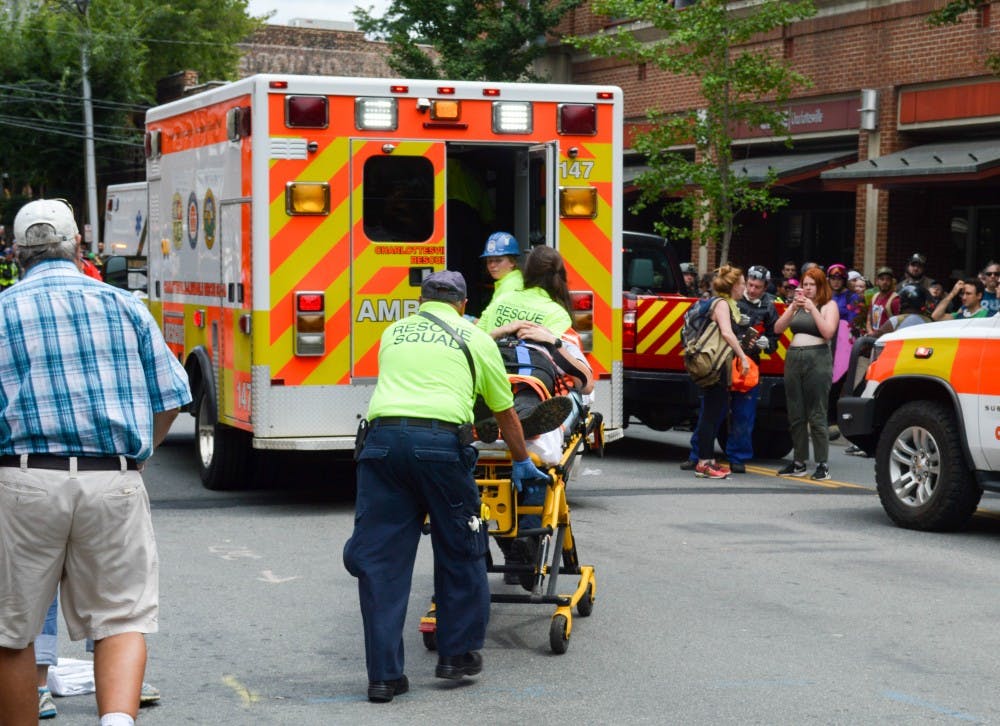
Thoughts from Aug. 12, the day when a “Unite the Right” rally was held in downtown Charlottesville ultimately resulting in a car attack which injured at least 35 people and killed 32-year-old Heather Heyer. White national groups claimed the event was held to protest City Council’s vote earlier this year to remove the Robert E. Lee statue from Emancipation Park.
“I was downtown during the events of Aug. 12 as a counter-protester, and I was in the Water St. intersection when the car hit the crowd … I am still haunted by the memory of the sight and sound of the crash, and I feel so deeply sad for the injured, for Heather Heyer, and for the city and even the country as a whole … As the University and City have done, it is vital to say with complete clarity how strongly we reject these viewpoints. And although there has been much disagreement about methods, I also feel that it is important to confront the hatred we saw and not let it be openly displayed without a strong and visible challenge.” — University lecturer, who asked to remain anonymous
“And then all of a sudden we heard bam, bam, bam, and I saw this car slide forward, which was from the accident. And I saw someone get hit by that car and fly sideways. And people started screaming, “gunshot, gunshot!” because nobody was really sure what was happening … I’ve taken various first aid courses … so I helped triage some of the patients. One woman had internal bleeding and a closed wound fracture … I helped with a few other situations, and then the ambulance eventually showed up ... There were no police. That entire time. There were no police. I watched them all go into the Omni hotel, all the city and state and county folk abandoned the streets. That’s pure insanity, I think it’s one of the reasons this happened, that there was no police presence or law enforcement or directing or enforcing the law. Everyone went crazy … I watched as our city fell apart. It went from this city of unity and love, which is what Charlottesville really tries to put forward, we want to be accepting of all. I watched that kind of crumble and turn into something that it was not. Which was awful. So I went home and did some thinking, trying to comprehend that this was where our city was tonight.” — Charlottesville resident Evan Kiernan
“The car crash happened right after we arrived home … I immediately felt utter horror that this could be happening in a town where I was born and raised. I have a deep connection with this place and a deep love for it. I found myself feeling grief for the loss of life and those who are wounded, grief also for the loss of a certain idea of the University and of Charlottesville because of this utterly vile intrusion into our lives and into our town.” — English Prof. Jahan Ramazani
“I took my children to Walnut Creek Park. When we arrived, there was a group of militia members who had used the park as a meeting point that day. About 50 of them used it as a staging point; 10 or so stayed throughout the day at the park, while the others went to protest the removal of the Robert E. Lee statue.” — Politics Lecturer Carah Ong Whaley
“As the pictures and videos came flooding in the next day, I was horrified at how much Charlottesville had been changed by these outsiders. I worried for the people I knew were down there in the mess, and who might be killed in the chaos. My dad told me he was glad I was still home, and I cried as I watched a video of the aftermath of the car driving through the crowd downtown.” — Second-year College student Jasmin Washington
“We live pretty close to downtown so as far as how the day unfolded, right from the morning the most obvious sign was the helicopter. All day the helicopter circled over the town and that was very present because you heard it, you saw it, and even being as far away as we were there was just this sense that something was happening. In my mind, that day is most associated with that helicopter, which is of course the one that crashed so there is the kind of unrealness of having the thing which was so present and then suddenly absent. All morning, [we were] hearing the helicopter and watching the updates, reading the stories, getting texts from people who were there describing it, feeling on edge.” — History Prof. Kyrill Kunakhovich
“I began watching the protesting the moment the media began broadcasting the event live … I was afraid, even though I was more than a hundred miles away. I was afraid for those I love, the city I love. It was soon after this that I found out that a car had deliberately crashed into the counter-protesters at the downtown mall … I was overcome by fear … I intended on returning to Charlottesville the Sunday after the rally, but my family was so frightened by the events they begged for me to stay home. All I felt was pain.” — Second-year Architecture student Tim Lasley
“That’s the moment the car hit. It happened right in front of us … it’s one of those things that’s hard to even talk about because it seems to exceed the normal emotional register for interpreting events. Just all of a sudden I saw what appeared to be bodies and signs just flying up in the air, and then all of a sudden there was screaming” — Graduate College student Ross Mittiga
“I ended up being very close to that car, it went right by me. I was at the front of the crowd when that happened, and I was rolling tape, so I have audio tape of the crash. It’s quite sickening to listen to and of course there’s a lot of video too, so, you know it’s no … it’s no question, especially to those of us who were there, that the driver accelerated unexpectedly, and it’s hard to interpret that as anything other than an attack.” — Roberto Armengol, Postdoctoral College Fellow in the Department of Anthropology
“And then the other, sort-of memory I have is there were a bunch of guys in white t-shirts with the haircuts and weapons, and about eight of them were sort-of marching by and looking very frustrated, and they stopped and their leader said to them ‘Well, you know, guys, I think it might actually be time that we started using these bullets.’ He said ‘I mean, we’ve got open carry, maybe we should use it.’ And you just, it’s like what kind of bizarre, like, TV show have I catapulted into? ‘I mean, we got open carry, maybe we should use it.’” — Lisa Goff, Assistant Professor of English, Director of Undergraduate Programs for American Studies and Director of Institute for Public History
“It was scary to see people getting beat up and tear gassed so close to U.Va. on national television, and it's an even scarier thought that had I actually been in Charlottesville during that period, I could have gotten hurt, especially as a minority woman.” — Second-year College student Megha Karthikeyan
“On Saturday, I stayed in my parents’ AirBnB the whole day. I didn’t sleep in my room the first three nights I was there because we were frightened that they were going to come back, especially after how things had escalated” — Fourth-year College student Alex Rigby
“I knew some people that were both in Charlottesville in general and at the rally itself going on in the downtown mall, so that was pretty scary too, you know, check up on them and see different things happening and then trying to make sure if they were involved in those things or not.” — Third-year College student Camille Polson
“Finding out that [my friend] had actually been hit — there was a moment that we didn’t know whether she was dead or alive, we didn’t know where she was. At that time, I wished for nothing more than to be in Charlottesville.” — Third-year College student Rawda Fawaz
“In the days after [the Unite the Right rally], when I caught wind of exactly how grave the situation was, when you hear about who got hurt, that there was a death, that members of our religious communities were getting harassed on the street, when I actually saw the footage and scrolled through all the media coverage, that's when I actually started to feel really guilty for not going downtown on Saturday and for choosing to stay home, because there was a huge part of me that was like, ‘This was the moment in which I was called upon to bear witness to the struggles of my peers,’ and I really failed to do that” — Third-year Batten and College student Alexa Iadarola
“On Aug. 12, I spent the day in front of the TV watching anxiously as the events unfolded. The sickness I felt in my stomach from the night before hadn’t worn off. Instead, it grew as I watched video clips of violence taking place in streets and parks that I not only recognized, but knew well.” — Third-year College student Isabel Getz
“As it was unfolding I said, ‘How could I have been more wrong?’ Even as a 50-year-old guy, a clinical psychologist, I’m supposed to know … a little bit about how people think and behave. I couldn’t remotely predict this and it’s still shocking to me.” — Tim Davis, Executive Director of Student Resilience and Leadership Development
“At that point I realized, like, I need to be down here. So on Aug. 13, I actually came down, I just came down earlier than I expected to just because I wanted to be there and wanted to see the aftermath and just be with friends who had been in Charlottesville at the time.” — Second-year College student and Second-Year Class President Omar Elhaj
“I know my parents got freaked out when they heard about what happened. My grandpa tried to convince me not to come back to school.” — Second-year College student Annelise Miranda
“My reaction to that was to refresh Twitter constantly for 48 hours and to not, essentially, leave my couch or talk to my family that entire weekend … because I was just refreshing Twitter. There was so much information coming out, so many pictures and videos, I was getting obsessive about it.” — Graduate College student Christopher Halsted
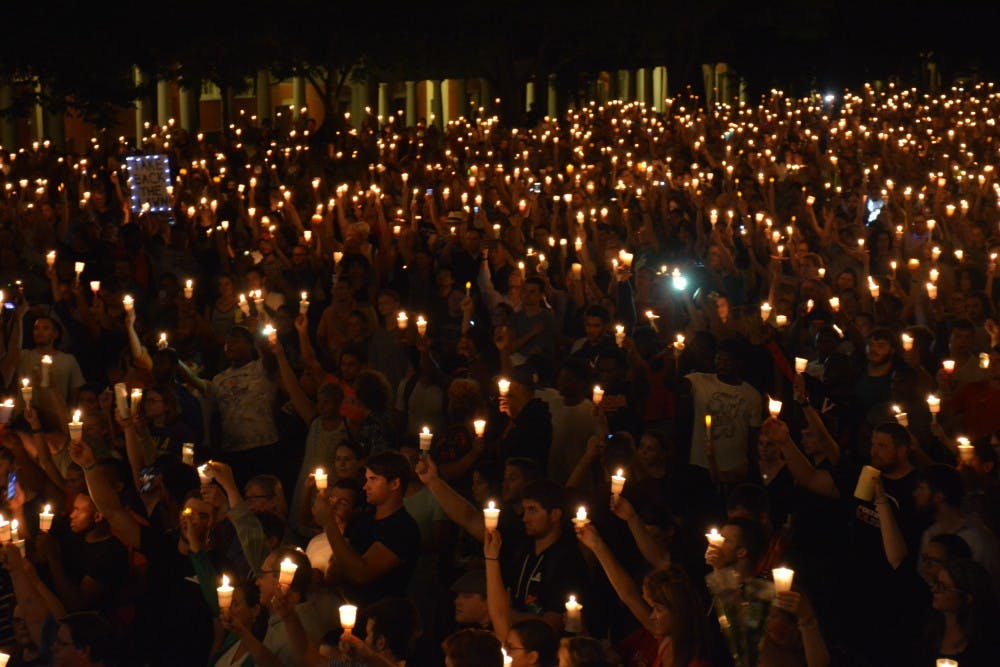
Thoughts from the candlelit march which took place on the Lawn Aug. 16 and was attended by thousands of people. Lifting up their candles, those present sang songs such as “We Will Overcome” and “Amazing Grace.”
“That was a very powerful impression to see the number of lights because it was dark and there was just this sea of candles. It is in some ways an understandable idea, reclaiming space, and in other ways a kind of odd idea, a weird ritual. It was really heartening to see that crowd, I think that was very powerful, but it was certainly a weird occasion. We were in the footsteps of the other march, with lights in the same space.” — History Prof. Kyrill Kunakhovich
“It was wonderful to join together so many people walking, reflecting and singing. It was a rare moment of unity, compassion and empathy among many different groups of people that might not normally come together … It was a moment of people reaching beyond themselves in way we don't see everyday. I was towards the front of the walk and we were led to sing "We Shall Overcome" ... for the walk from Nameless Field to the Rotunda.” — Politics Lecturer Carah Ong Whaley
“The night after the vigil, I walked into our house, and my mother was on the brink of tears, she asked me to come over to her. My mother and father were watching the news, and saw the beautiful act that the student body performed.” — Second-year Architecture student Tim Lasley
“People sang but when there were moments between songs, you could hear the crickets and it was kind of somber. But I’m glad that that happened because that helped to reframe things before the start of the semester in a useful way.” — English Prof. John O’Brien
“I thought it was interesting, like ‘they came with torches, we’ll come back with candles.’ It was a way to bring people back together.” — First-year College student Joe Montante
“I guess my other reaction was kind of an eerie mirror-image, of people again marching on the lawn carrying things lit on fire — I understand candlelight vigils, but there’s kind of a weird parallelism there, and maybe we should ban open flames on the lawn altogether.” — Graduate College student Christopher Halsted
“At first I thought, well, this is what Charlottesville is going to turn into — it’ll be a race war, a supremacy war, but after I went to the memorial and the candlelight service, I saw the real Charlottesville … It’s not judgment and hate and discrimination, it’s unity and peace and love. Downtown they’ve put up a huge banner that says ‘Love.’ That’s Charlottesville.” — Charlottesville resident Evan Kiernan
The interviews for this article were conducted by the following members of The Cavalier Daily’s news team: Alexis Gravely, Ankita Satpathy, Anna Pollard, Bridget Starrs, Colleen Schinderle, Geremia Di Maro, Hannah Gavin, Jacob Wilkins, Kate Bellows, Liv Rinaldi, Riley Walsh, Maliha Jahangiri, Maggie Servais, Maggie Snow, Matthew Gittelman, Meghan Tonner and Thomas Roades.

